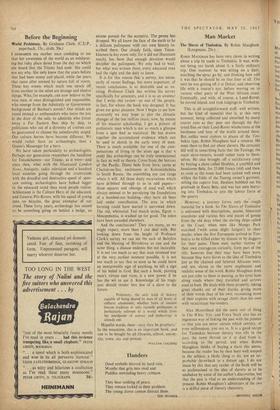Man Market
The Slaves of Timbuktu. By Robin Maugham. (Longmans, 25s.)
ROBIN Nit/writ-Ism has been very clever in writing about a trip he made to Timbuktu. It was, with- out being too harsh about it, a fairly ordinary trip. One moment he was sitting on a liner, watching the spray go by, and thinking how odd it was that he should be on that liner at all. The next he was getting off it at Dakar, and observing life with a tourist's eye, before moving on to various other parts of the West African coast. Eventually, and with, of course, a Land-Rover, he moved inland, and took lodgings in Timbuktu.
This is all straightforward stuff, well written, but the kind of material that is, at this very moment, being collected and absorbed by many tourist eyes as they peer out through the flat- tened flies on their Land-Rover windscreens at the harshness and heat of the world around them. But unlike most visitors to places of the Tim- buktu type, Robin Maugham had a mission. He went there to find out about slavery. He certainly did well in unearthing facts that the Tuaregs, the main slave-owners, would rather keep to them- selves. He also brought off a satisfactory coup by buying a slave called Ibrahim, a youthful and handsome Bela, for 25,000 francs (old) and then, as soon as the notes had been tucked well away within the folds of the Tuareg owner's garment, setting the captive free. Ibrahim bubbled out his gratitude in fluent Bela. and was last seen hurry- ing into Timbuktu. to join the labour force at the quarry.
However, a journey forms only the rough material for a book. So The Slaves of Timbuktu
enlivened with descriptions, quotes, historical anecdotes and various bits and pieces of gossip from the old days when the slaving ships called at the Coast, when men like Mungo Park marched (`with some slight fatigue') to their deaths, when the first Europeans arrived in Tim- buktu to be killed either by disease or by daggers for their pains. These men, earlier victims of their own courageous curiosity, form part of the title, however free they may have been born, because they were slaves to the idea of Timbuktu just as the chained and fettered Africans were. and are, slaves in the more unpleasant and realistic sense of the word. Robin Maugham does not just refer to them in passing, as his tyres hum along roads where they travelled and arrows used to hum. He deals with them properly, taking great chunks out of their diaries, giving more of their words than of his own, recounting more of their exploits with savage chiefs than his own with recalcitrant bar-tenders.
Alan Moorehead did the same sort of thing in The White Nile, and Freya Stark also has an ingenious way of linking the past with the present so that you are never certain which century, or even millennium, you are in. It is a good recipe for Timbuktu because slavery was rife in the past. the town thrived on it or died from it, according to the period, and when Robin Maugham thinks of buying a slave this seems, because the reader has by then been well steeped in the subject, a likely thing to do, not an im- probable throwback to a distant age. I do not mean by this that any reader of the book will be so acclimatised to the idea of slavery as to be unshaken by some of the author's discoveries. but that the past is vital to an understanding of the present. Robin Maugham's admixture of the two is a skilful piece of literary chemistry.
ANTHONY, SMITH














































 Previous page
Previous page